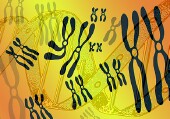Germline mutations detected at a frequency of 1.3 percent in patients with early-onset colorectal cancer
FRIDAY, March 13, 2015 (HealthDay News) — For patients with early-onset colorectal cancer, germline TP53 mutations occur at a frequency of 1.3 percent, according to a study published online March 12 in JAMA Oncology.
Noting that Li-Fraumeni syndrome is usually characterized by germline TP53 mutations and has been linked to early-onset colorectal cancer, Matthew B. Yurgelun, M.D., from the Dana-Farber Cancer Institute in Boston, and colleagues examined the frequency of germline TP53 alterations in patients with early-onset colorectal cancer. Biospecimens, including microsatellite instability and DNA mismatch repair immunohistochemistry results, were collected from consenting probands and families from the Colon Cancer Family Registry. Data were included from 510 individuals diagnosed with colorectal cancer at age 40 years or younger, and lacking a known hereditary cancer syndrome. Fifty-three of these participants were excluded after identification of germline mutations in DNA mismatch repair genes or biallelic MUTYH mutations.
The researchers found that six of the 457 eligible participants (1.3 percent) carried germline missense TP53 alterations; none of these met the clinical criteria for Li-Fraumeni syndrome. Two of the alternations were novel, while four had been previously described in the literature in probands with clinical features of Li-Fraumeni syndrome.
“With the increasing use of multigene next-generation sequencing panels in hereditary cancer risk assessment, clinicians will be faced with the challenge of interpreting the biologic and clinical significance of germline TP53 mutations in families whose phenotypes are atypical for Li-Fraumeni syndrome,” the authors write.
Two authors disclosed financial ties to Myriad Genetic Laboratories.
Copyright © 2015 HealthDay. All rights reserved.








